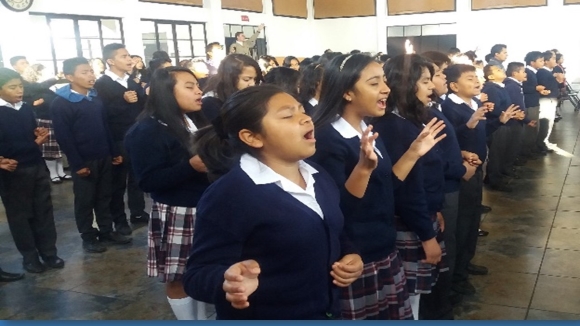Transformation: A Change of Society

Note: This is part four of a four-part series on the distinctives of transformational education, in which we explore four types of changes. These changes correspond to TeachBeyond’s four foundational principles and influence everything we do in our schools and classrooms. To read part 1, click here; for part 2, click here; and to read part 3, click here.
“… the gospel is bearing fruit and growing
throughout the whole world …”
—Colossians 1:6[i]
I was taking a picture of the students in a Christian school when I imagined all these children going out into their communities full of the Holy Spirit and on fire to serve God. I saw the tremendous potential they had to make a difference in their communities and in the world. What was the magic ingredient we needed to add to give them what they needed to be the Lord’s army for the transformation of their society? Maybe it wouldn’t be as simple as adding spices to the soup, but how about a dash of love, grace and truth?
All of these, of course, are qualities of Jesus. As followers of Jesus, we want to be like him and to see each of our students grow into his image. So we provide an education that helps develop these qualities. However, unlike other educational systems, educational goals are not just for the benefit of the student, but for the benefit of humanity. We are not developing consumers of knowledge but preparing young people for service in the Kingdom of God.
As students are transformed, they can have an immediate impact on their families and friends. Then, as they take up their calling in life, they can influence all areas of society by not only being good in their field but also by being examples of respect, compassion, joy and integrity while they are doing it. As transformed role models in all walks of life, students will shine a light in the darkness, attract others to Christ and fulfill God’s plan for the world.
A school can do several things to facilitate this ‘transformation in action’. It can be involved in the community and in worthwhile projects around the world. It can take seriously the two directives given by God to show us what we are to be doing with our lives and how we can impact the lives of the students so they can influence the society.
The first directive involves us in the
Ministry of Reconciliation.
“All this is from God, who reconciled us to himself through Christ and gave us the ministry of reconciliation …”
—2 Corinthians 5:18
Reconciliation is the healing of relationships. Our students have relationships in a number of areas that are broken. This keeps them from being all that they can be and from living the type of life that can make a difference in the world.
Their most important relationship is with God. We all are separated from our heavenly Father by our sin nature. It is God’s plan to restore this relationship. All our students should understand this and be encouraged to receive Christ through the continuous revealing of the Gospel story through word and action.
Sadly, many students come from situations where they are damaged on the inside by neglect, abuse, abandonment or rejection. They often blame themselves or at least see themselves as worthless and unlovable. In these cases God’s heart is to reconcile the relationship they have with themselves by showing them their true identity in Christ. They have eternal value as children of God and as such are eternally and unconditionally loved. We can help by seeing children as God sees them and treating them that way.
Even in our school communities, we see much heartache from broken relationships. Often teachers can help students navigate the rocky waters of peer relationships. Teachers are called on to correct aggressive behavior, settle disputes, help students to cooperate, teach them how to be thoughtful and giving to their classmates and how to mend those relationships when there is some offence. These skills can also be translated to relationships outside the school, especially bringing reconciliation to families.
We can use the context of daily life in the classroom to be continuously involved in the reconciliation process. Reconciliation frees the child to experience transformation and prepares them to be leaders in taking God’s grace to the world.
“All authority in heaven and on earth has been given to me.
—Matthew 28:18
This verse clearly states that the mission of every Christian and Christian organization is to somehow be involved in making disciples. For those of us in Christian education, the table is clearly set in front of us.
Much of what we talk about as foundations and principles of transformational education involves discipleship. The two are closely related. We are to be intentional about making disciples and to rely on God to do the transforming.
What this means for the Christian school is that we help students to follow Jesus: to have his vision and purpose, to know the truth about the way the world is, to develop character and Godly values, to love God, to love others, and to share Christ.
Discipleship is the strategy for the transformation the world that Jesus demonstrated for us during his years on earth. His goal was that every person would hear the good news of everlasting life. He spent most his time with a small group of individuals whom he prepared to take the Gospel to the whole world. They were to do this by discipling others who in turn would prepare others to do the same thing. This multiplication effect proved effective in turning the world upside down. If we prepare our students to take part in this plan, we will see similar fruit.
Teachers should never lose the vision of the long-term results of the transformation process or what God can do with what they pour into student’s lives, even if they don’t always see the results. Like the loaves and fishes, God will multiply our efforts way beyond the classroom.
Bob Adams
Education Consultant
TeachBeyond Global
[i] All Scripture quotations taken from THE HOLY BIBLE, NEW INTERNATIONAL VERSION®, NIV® Copyright © 1973, 1978, 1984, 2011 by Biblica, Inc.® Used by permission. All rights reserved worldwide.
Photo Credits:
Water Drop Explored by Sergiu Bacioiu via Flickr. Resized.
Students by Bob Adams
